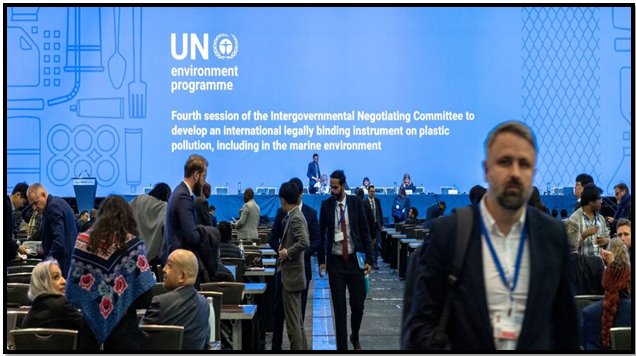REMOULDING THE GLOBAL PLASTICS TREATY
SYLLABUS:
GS 3:
- Conservation, environmental pollution and degradation, environmental impact assessment.
Focus:
- Global leaders will gather in Canada’s capital -Ottawa – to discuss progress in drafting a first-ever global treaty to rein in soaring plastic pollution by the end of the year. This treaty is expected to be finalized by the end of this year.
Source: UN
Introduction to the Informal Waste Sector
- Vital Role in Waste Management: Informal recycling workers play a crucial role in managing waste, collecting, sorting, and recycling materials that would otherwise end up in landfills or polluting the environment.
- Economic Contributions: By recovering recyclable materials, these workers alleviate financial burdens on municipal waste management budgets and indirectly subsidize the waste management responsibilities of producers, consumers, and governments.
- Environmental Impact: Their activities significantly reduce the volume of plastic in landfills and dumps, preventing plastic leakage into natural habitats and water bodies.
- Sustainability Champions: These workers support circular waste management practices, contributing valuably to sustainability and mitigating greenhouse gas emissions.
- Underappreciated Labor: Despite their contributions, informal recycling workers are often overlooked and underrepresented in policy discussions, remaining vulnerable within the plastic value chains.
Risks and Challenges Faced by Informal Recyclers
- Increasing Privatization: The trend towards privatizing waste management poses a threat to the livelihoods of informal workers who rely on accessing waste materials freely.
- Technological and Policy Exclusion: Projects like waste-to-energy and incineration, along with policies including Extended Producer Responsibility (EPR) norms, often exclude informal workers, jeopardizing their jobs and income.
- Lack of Formal Recognition: Without formal recognition, these workers face challenges in accessing the rights and protections typically afforded to formal sector employees.
- Health and Safety Risks: Informal recycling work involves significant health risks, with workers often operating without adequate safety gear or formal training.
- Economic Instability: The informal nature of their employment makes these workers particularly susceptible to economic downturns and market fluctuations in the value of recyclable materials.
Global Plastics Treaty and the Need for a Just Transition
- Framework for Action: The Global Plastics Treaty aims to create a legally binding international framework to reduce and ultimately eliminate plastic pollution.
- Inclusion of Informal Sector: It is crucial that the treaty includes specific provisions to support the transition of informal recycling workers into formal economies, recognizing their role and integrating their knowledge and skills.
- Formalization and Integration: Advocates call for the formalization of informal waste sectors, which would help secure the livelihoods of these workers and improve their working conditions.
- Equitable Participation: The treaty should ensure that informal recyclers are involved in the negotiation processes and that their voices are heard in the formulation of policies.
- Defining a Just Transition: There needs to be a clear and universally accepted definition of what a “just transition” for the informal waste sector entails, focusing on securing rights, providing safety nets, and enhancing their economic opportunities.
Negotiations in Ottawa (Global Plastic Treaty): Key Challenges and Stakeholder Positions
|
Role of International and National Entities
- UN and Intergovernmental Efforts: The United Nations Environment Assembly and other international bodies have emphasized the importance of inclusivity in discussions about reducing plastic pollution.
- Support from NGOs: Organizations like the International Alliance of Waste Pickers advocate for the rights of informal workers and their inclusion in international policy discussions.
- National Policies and Support: Countries like India play a critical role by promoting models that integrate reuse, repair, and recycling practices that consider the socio-economic contexts of informal workers.
- Capacity Building: Governments and NGOs should collaborate to provide training and resources to help informal recyclers adapt to new technologies and practices.
- Legal and Social Protection: There is a need for laws that recognize and protect informal recyclers, providing them with the benefits and protections equivalent to those in formal employment.
Conclusion and Call to Action
- Acknowledgment of Contributions: As the global community moves towards a plastic-free environment, it is essential to acknowledge and leverage the significant contributions of informal recyclers.
- Integration into Global Policies: Their integration into global and national policies would not only ensure the effectiveness of these policies but also secure social justice and equity.
- Promotion of Sustainable Practices: By formally integrating informal recyclers, policies can promote more sustainable waste management practices that are beneficial to both the environment and the economy.
- Protection of Rights: Ensuring the rights and protections of these workers is fundamental to a just transition and to the sustainability of the waste management sector.
- Global and Local Collaboration: A collaborative effort between global entities, national governments, and local organizations is necessary to achieve these goals and ensure a fair and effective approach to combating plastic pollution.
India’s Key Initiatives on Plastic Waste Management:
|
Source:The Hindu
Mains Practice Question:
“Given the rising challenge of plastic waste management and the significant role played by the informal sector in recycling and waste recovery, discuss the potential impacts of a globally binding plastics treaty on the informal recycling workers. Critically analyze how such a treaty could be structured to ensure a just transition for this vulnerable group.
Associated Articles:
https://universalinstitutions.com/ban-on-single-use-plastics/




